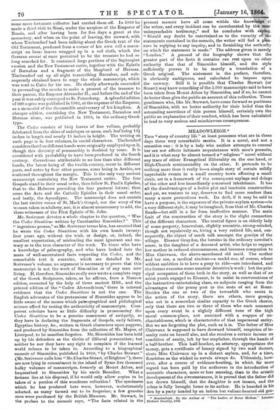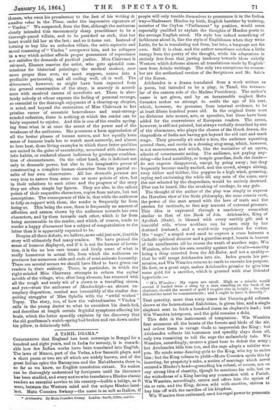MEADOWLEIGH.* Tins " story of country life " at least
possesses what are in these days three very remarkable merits. It is a novel, and not a sensation one ; it is by a lady who neither attempts to conceal her sex nor affects intimate acquaintance with men's pursuits, and it is what may be almost termed a" religious " novel without any trace of either Evangelical illiberality on the one hand, or High-Church sentimentality on the -other. It pretends to be nothing more than it really is—a simple story of certain mildly improbable events in a small country town affecting a small circle, set in a framework of the consequent sayings and doings of the other and less immediately concerned inhabitants. It has all the disadvantages of a feeble plot and inartistic construction and yet, we venture to say, deserves to find more readers than many a more pretentious work. Its drift, if it may be said to have a purpose, is the exposure of the private-asylum system—in a very different style, it may be imagined, from that of Mr. Charles Reade—but still in a far from ineffective manner. The main fault of the construction of the story is the slight connection of the different characters. The central figure is an elderly lady of some property, benevolent, slightly eccentric, strong-minded, though net repulsively so, living a very retired. life, and, con- sequently, the object of much talk amongst the gossips of the village. Eleanor Graydon, the heroine in the ordinary novelist's sense, is the daughter of a deceased artist, who helps to support her mother in reduced circumstances, and becomes companion to Miss Clairvaux, the above-mentioned old maid. The mother and her son, a medical student—a model one, of course, whose wildest ambition is to have a pony to ride—are introduced, and the former executes some amateur detective's work ; but the prin- cipal occupation of them both in the story, as well as that of an artist youth engaged to Eleanor, is to assist in conversations of the instructive-entertaining class, on subjects ranging from the advantages of the penny post to the state of art at Rome. Besides the one or two of the townsfolk who assist in the action of the story, there are others, mere gossips, who act in a somewhat similar capacity to the Greek chorus, only that there are two or three of them who each comment upon every event in a slightly different tone of the high moral common-place, not unmixed with a soupcon of un- charitableness, which is characteristic of that impersonal entity. But we are forgetting the plot, such as it is. The father of Miss Clairvaux is supposed to have drowned himself, suspicion of in- sanity rests on herself also, and she receives a certain income on condition of sanity, left by her stepfather, through the hands of a half-brother. This half-brother, an attorney, appropriates the money, gets a certificate of lunacy signed by two mad doctors, shuts Miss Clairvaux up in a distant asylum, and, for a time, flourishes as the wicked in novels always do. Ultimately, how- ever, after a course of evidence-hunting, in which far more regard has been paid by the authoress to the introduction of eccentric characters, more or less amusing, than to the artistic development of the circumstances, it is proved that the father did not drown himself, that the daughter is not insane, and the crime is fully brought home to its author. He is bearded in his den by a party headed by an infirm but valiant-hearted old gen-
* Meadowkigh. By the Author of " The Ladles of Bever Hollow." London: Richard Bentley, 1863.
tleman, who owes his prominence to the fact of his writing de ontraus rebus in the Times, under the impressive signature of " Vindex." We suspected, from the first, although the authoress clearly intended this uncommonly sharp practitioner to be a thorough-paced villain, and to be punished as such, that her heart would fail her at the last; and so it turns out. Instead of turning to bay like an orthodox villain, the mitis sapientia and moral reasoning of " Vindex " overpower him, and he collapses in a way which neither affords proper guarantees of repentance nor satisfies the demands of poetical justice. Miss Clairvaux is released, Eleanor marries the artist, who gets splendid com- missions for historical paintings; the medical student, now more proper than ever, we must suppose, enters into a profitable partnership, and all ending well, all is well. The denouement, however, as might have been expected from the general construction of the story, is scarcely in accord- ance with received canons of novelistic art. There is abso- lutely nobody at whose expense the feeling of personal revenge, so essential to the thorough enjoyment of a clearing-up chapter, is sated, and beyond the restoration of Miss Clairvaux to her pristine career of eccentric benevolence and semi-strong- minded reflection, there is nothing at which the reader can be fairly expected to rejoice. And this is one of the results spring- ing from what is at once the secret of the power. and of the weakness of the authoress. She possesses a keen appreciation of all the better phases of human nature, and her equally keen sense of humour leads her to watch most narrowly, and almost to love best, those living examples in which those latter qualities are united in the guise of eccentricity, associated with character- istic habits, or rendered almost ludicrous by grotesque combina- tion of circumstances. On the other hand, she is deficient not only in dramatic power, but also in the imaginative power of constructing a complete human character from the partial re- sults of her own observation. All her dramatis persons are very true to nature from some one or more points of view, but in their relations to each other and the progress of the story they are often simple lay figures. They are also, in the salient points of their respective characters, copies from nature, but not conceptions. The oonsequence of this is, that while the authoress is fully en rapport with them, the reader is frequently far from being so. This being the case, there is frequently an amount of affection and esteem shown by the authoress towards her own characters, and by them towards each other, which is far from being accountable to the reader, and which, of course, tends to render a happy denouement less a subject of congratulation to the latter than it is apparently expected to be.
Despite all these defects, we believe, as we said just now, thatthis story will ultimately find many readers. We have praised the sense of humour displayed, and if it is not the humour of inven- tion, it is the no less rare innate and lively sense of what is really humorous in actual life, from which the authoress re- produces her numerous odds and ends of semi-animate humanity. There are several scenes we should have liked to have given our readers in their entirety. Those, in particular, in which the right-minded Miss Clairvaux attempts to reform the enfant terrible of the village, who, after long absence, has returned with all the rough and ready wit of a clown to a travelling circus, and yet—trust the authoress of Meadowleigh—an almost ex- emplary disposition, remind one irresistibly of the similar des- pairing struggles of Miss Ophelia with the " awful wicked " Topsy. The story, too, of how the valetudinarian " Vindex " calls in the young doctor to what he considers his death-bed, and describes at length certain frightful symptoms affecting his brain, which the latter speedily explains by the discovery that the old gentleman's watch-spring had broken and run down under his pillow, is deliciously told.































 Previous page
Previous page